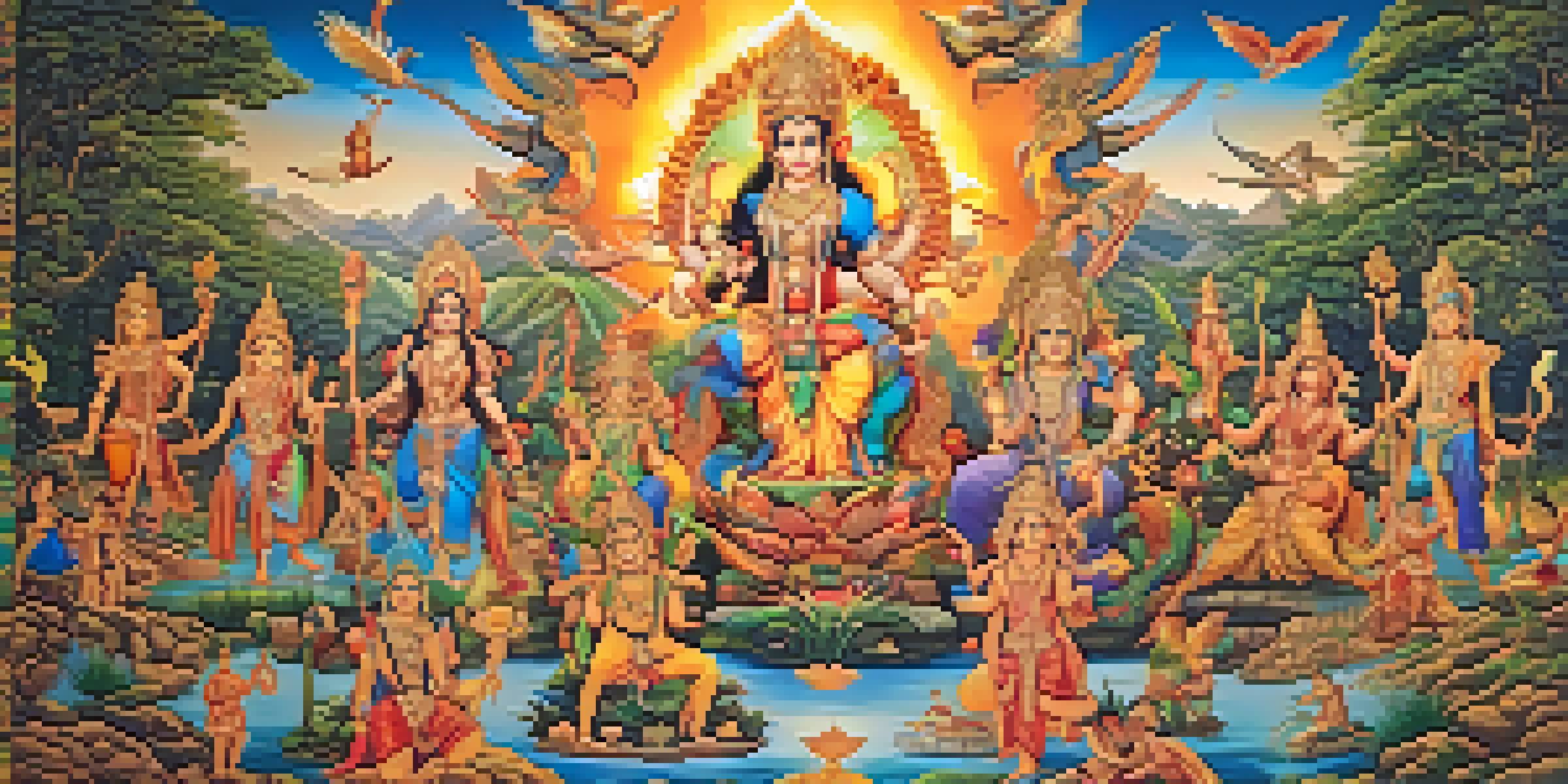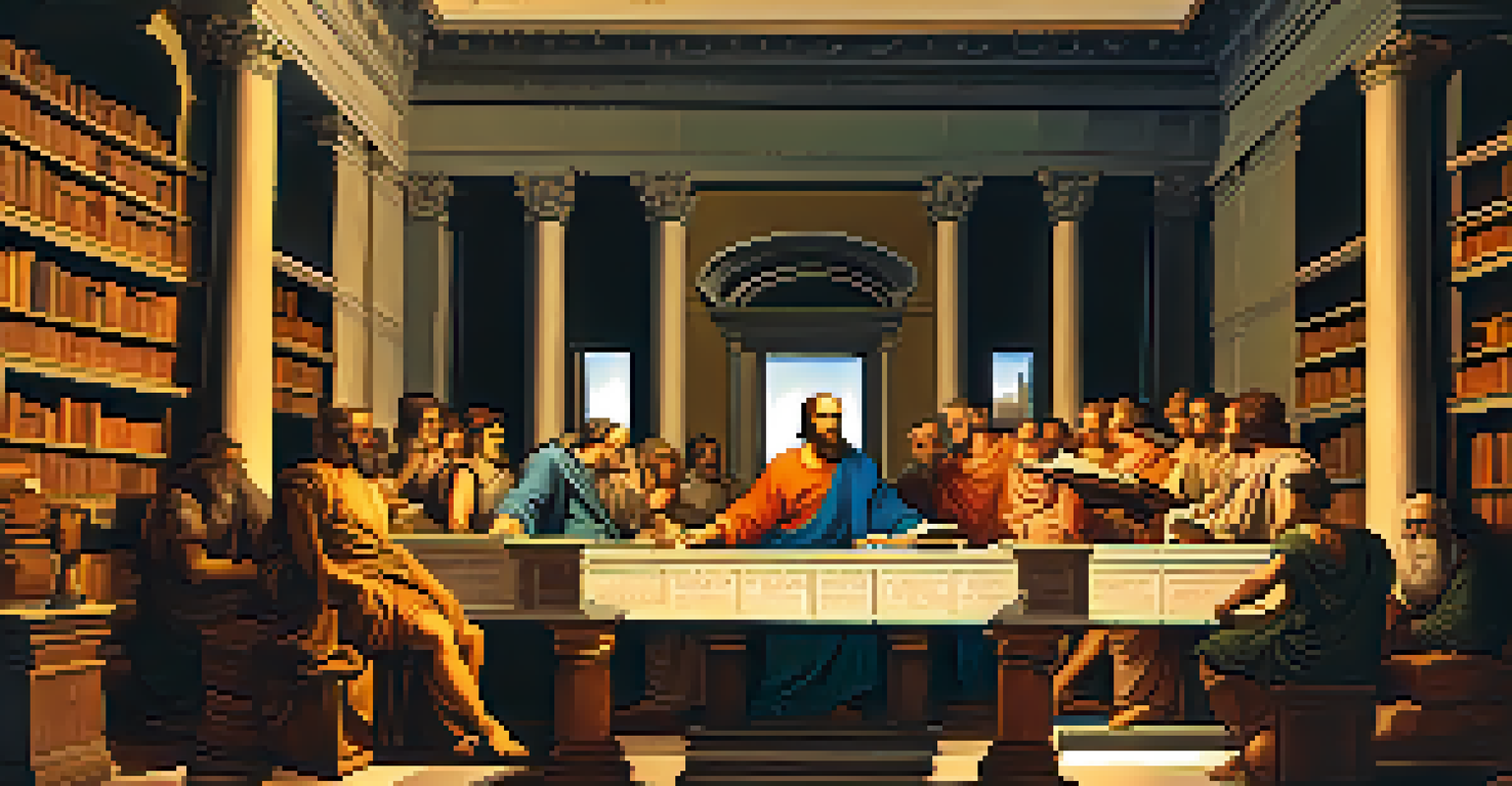Polytheism to Monotheism: A Shift in Spiritual Paradigms

Understanding Polytheism: A World of Many Gods
Polytheism is the belief in multiple gods, each governing different aspects of life and nature. Imagine a vibrant tapestry where each thread represents a deity, from the sun to fertility, creating a rich and complex spiritual landscape. Ancient cultures, like the Greeks and Egyptians, embodied this belief, attributing natural phenomena and human experiences to their pantheon of gods. This worldview fostered a sense of community as rituals and worship practices brought people together to honor their diverse deities.
The greatest enemy of knowledge is not ignorance, it is the illusion of knowledge.
In polytheistic societies, gods were often seen as capricious, reflecting the unpredictability of life itself. This belief system allowed for various interpretations of existence, providing followers with a sense of agency through offerings and prayers. For example, a farmer might pray to a harvest god for a bountiful crop, showcasing how personal needs influenced divine interactions. Such relationships were not just transactional; they embedded spirituality into daily life and societal norms.
However, as civilizations evolved, the limitations of polytheism began to surface. The complexity of worshiping multiple gods could lead to confusion and conflict, especially as empires expanded and cultures collided. This paved the way for new spiritual paradigms, prompting a search for a more unified understanding of the divine.
The Rise of Monotheism: A Single Divine Entity
Monotheism, the belief in one all-powerful God, emerged as a transformative shift in spiritual thought. This transition can be likened to zooming in on a single image after viewing a broad landscape; it offers clarity and focus. Key figures, such as the Hebrew prophet Moses, played significant roles in shaping monotheistic beliefs, emphasizing a covenant between God and humanity. This shift not only simplified worship but also introduced new ethical frameworks and communal identities.

In monotheistic religions like Judaism, Christianity, and Islam, God is often portrayed as a personal, caring entity who desires a relationship with believers. This idea contrasts sharply with the distant and often untouchable gods of polytheism. For instance, the concept of a loving God who forgives and guides provides comfort and hope, fostering a deeper connection among followers. Such relationships encourage moral accountability, as believers strive to align their lives with divine principles.
Polytheism's Rich Spiritual Diversity
Polytheism embraces a vibrant tapestry of multiple gods, each influencing different aspects of life and fostering community through shared rituals.
Moreover, monotheism has had a profound impact on cultural and political structures throughout history. The unifying belief in one God has often served as a rallying point for communities, influencing laws and societal norms. This sense of shared belief can create strong identities, as seen in the emergence of nation-states that align with specific faiths, ultimately reshaping the course of human civilization.
Cultural Influences on the Shift from Polytheism to Monotheism
The shift from polytheism to monotheism did not happen in isolation; it was heavily influenced by cultural, social, and political factors. As societies grew more complex, the need for cohesion and unity became critical. For example, the rise of empires often necessitated a common religious framework to unify diverse populations, leading to the adoption of monotheistic beliefs. This process can be likened to constructing a bridge that connects different cultures, making it easier for them to coexist.
To be a good philosopher, you must be a good listener, and to be a good listener, you must be open to all possibilities.
Additionally, philosophical movements contributed to this transformative shift. Thinkers like Plato and Aristotle explored concepts of the divine, inspiring a more abstract and unified notion of God. Their ideas encouraged followers to seek a singular truth, prompting many to question the validity of polytheistic practices. This intellectual exploration can be seen as a journey toward enlightenment, where individuals seek deeper meanings and connections.
Moreover, the spread of monotheistic religions often accompanied trade routes and conquests, further integrating these beliefs into various cultures. As merchants and travelers shared their faiths, communities were introduced to new spiritual ideas, leading to gradual acceptance or adaptation. This blending of beliefs showcases humanity's innate desire for connection and understanding in an ever-changing world.
Philosophical Underpinnings of Monotheistic Beliefs
Philosophy has played a crucial role in shaping monotheistic beliefs, offering frameworks that support the existence of a singular deity. The concept of a ‘first cause’ or ‘prime mover’ posited by philosophers suggests that everything in existence must have originated from one source. This idea resonates with monotheistic teachings, providing a rational basis for faith in a singular God. It’s akin to tracing the roots of a tree back to its seed, emphasizing a singular origin.
Moreover, the moral implications of monotheism have sparked philosophical debates throughout history. The belief in one God often comes with a set of ethical guidelines, shaping how followers interact with one another and the world. For instance, the Ten Commandments in Judaism and the teachings of Jesus in Christianity provide clear moral directions. This emphasis on ethics encourages individuals to reflect on their actions and their impact on society, promoting a sense of responsibility.
Monotheism's Unifying Shift
The rise of monotheism simplified spiritual beliefs by focusing on a single, all-powerful God, fostering deeper personal connections and ethical frameworks.
Additionally, monotheism often invites philosophical questions about the nature of God, existence, and the universe. Thinkers like Augustine and Aquinas explored these topics, bridging faith and reason. By doing so, they offered believers tools to understand their faith more deeply, creating a rich dialogue between philosophy and spirituality that continues to evolve today.
The Role of Religious Texts in Monotheism
Religious texts serve as the cornerstone of monotheistic beliefs, providing guidance, inspiration, and a historical record of faith. Scriptures like the Bible, Quran, and Torah not only narrate the stories of divine interactions but also lay down moral and ethical principles for followers. Consider these texts as a map for spiritual journeys, offering insights and directions for navigating the complexities of life.
Moreover, the interpretation of these texts can lead to diverse understandings of God and spirituality. Different denominations and sects often emerge from varying interpretations, showcasing the richness of monotheistic faiths. For instance, Christianity has numerous denominations, each with unique beliefs and practices, reflecting the multifaceted nature of understanding the divine. This diversity within unity can be likened to different paths leading to the same mountain peak.
Additionally, the role of religious texts extends beyond individual belief; they shape communal identities and traditions. Rituals, celebrations, and moral teachings derived from these scriptures foster a sense of belonging among followers. These collective practices not only reinforce faith but also create lasting bonds within communities, emphasizing the shared journey of spirituality.
Modern Implications of the Shift to Monotheism
The transition from polytheism to monotheism has significant implications for modern society, influencing everything from ethics to politics. In many ways, monotheistic beliefs have laid the groundwork for contemporary moral frameworks, shaping laws and societal norms. For example, principles of justice and equality found in monotheistic teachings resonate with modern human rights movements, emphasizing the dignity of every individual.
Furthermore, monotheism has sparked discussions around tolerance and coexistence in a diverse world. As globalization connects people from different faiths, understanding and respecting various beliefs becomes essential. Interfaith dialogues often emerge from monotheistic foundations, encouraging collaboration and mutual respect among religions. This can be seen as a step toward unity, where differences are acknowledged, yet a common humanity is celebrated.
Cultural Impact of Religious Shifts
The transition from polytheism to monotheism was shaped by cultural, philosophical, and political factors, influencing the way communities understand divinity and coexist.
Additionally, the rise of secularism and individual spirituality challenges traditional monotheistic practices. Many individuals are now exploring spirituality outside organized religion, seeking personal connections with the divine. This evolution reflects a broader quest for meaning, showcasing how the journey from polytheism to monotheism continues to shape spiritual landscapes today.
Conclusion: The Ongoing Journey of Spirituality
The shift from polytheism to monotheism illustrates a profound evolution in human spirituality, reflecting our quest for understanding and connection. This journey is not merely a historical transition; it continues to unfold in contemporary society. As individuals explore their beliefs, they often navigate between traditions, seeking what resonates most deeply with their experiences and values.
Moreover, the dialogue between polytheistic and monotheistic perspectives can enrich our spiritual journeys. Recognizing the beauty in diverse beliefs fosters a sense of openness and curiosity, allowing us to learn from one another. This exchange can lead to deeper insights into our own faiths and a greater appreciation for the shared human experience.

Ultimately, whether one identifies with polytheism, monotheism, or a blend of both, the journey of spirituality remains a personal and evolving path. Embracing this journey with an open heart and mind can lead to profound discoveries, shaping not only our individual beliefs but also our collective understanding of the divine.